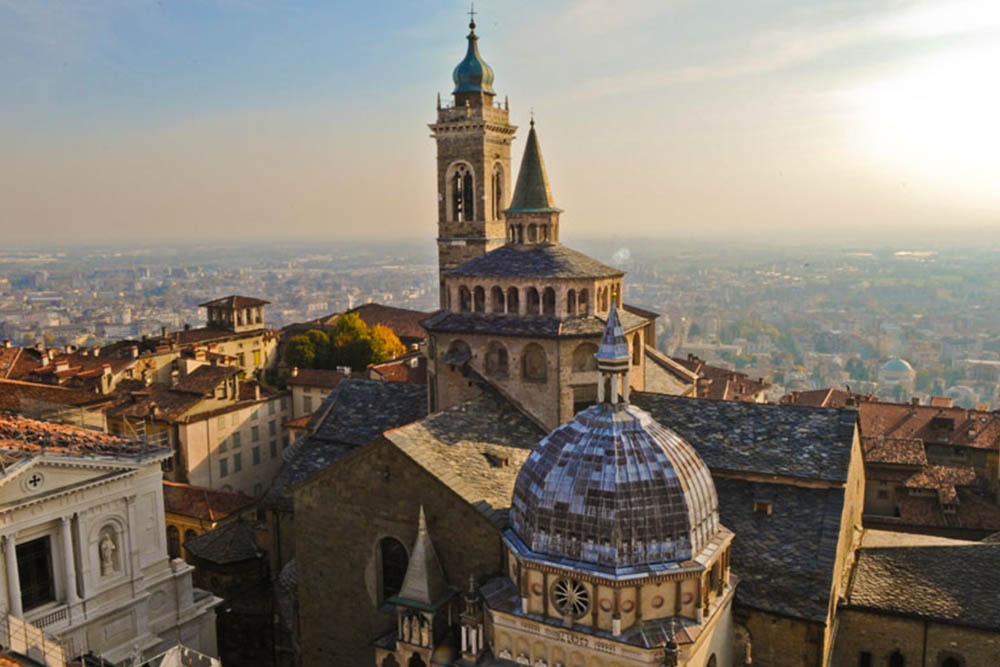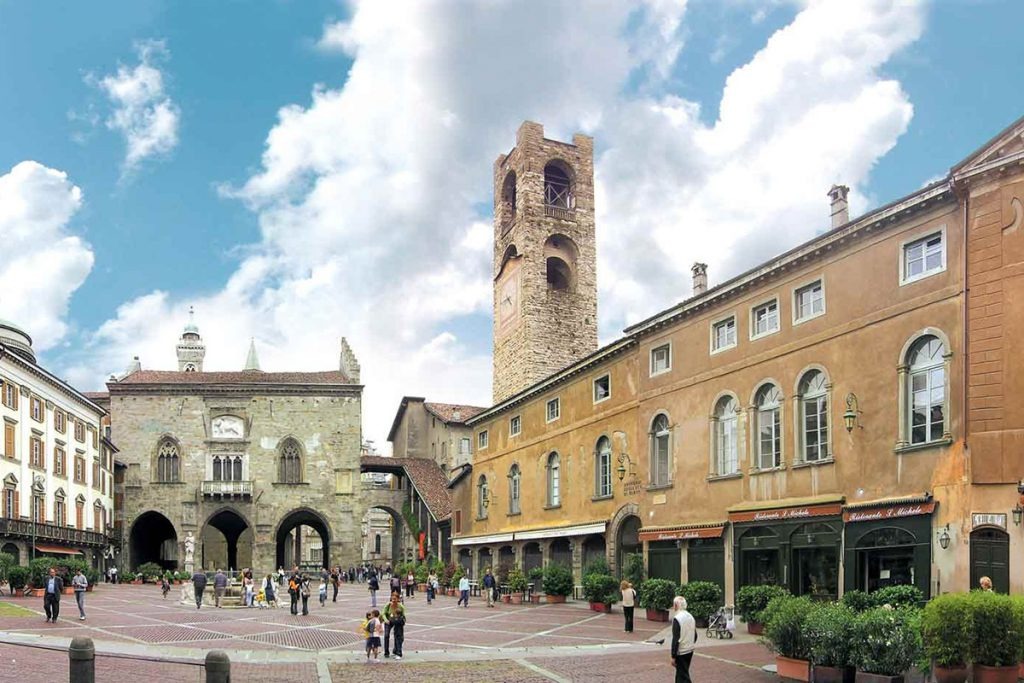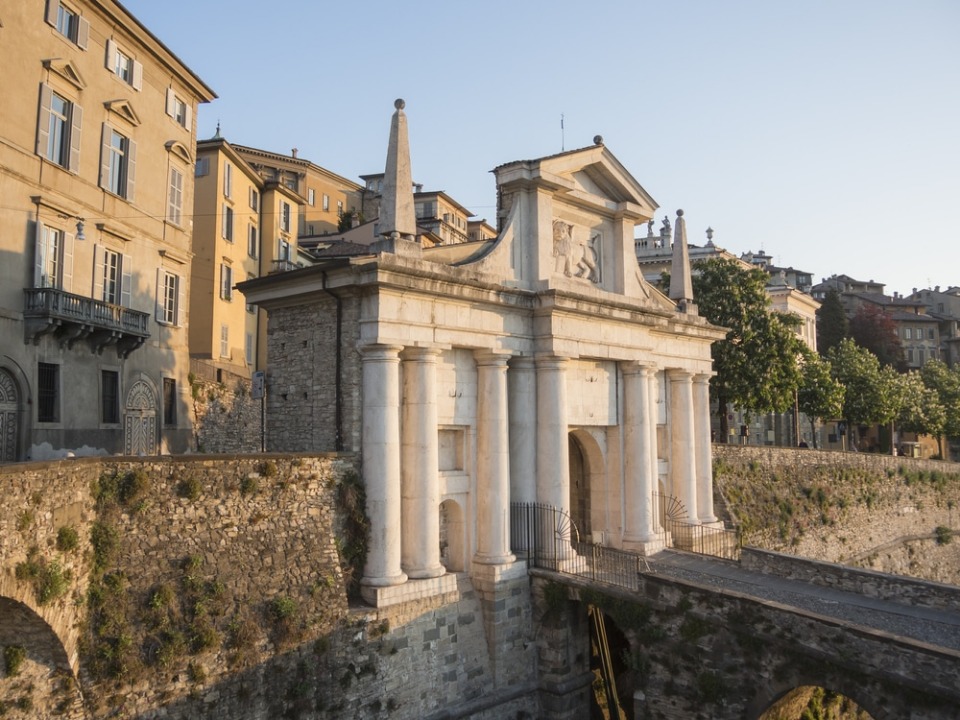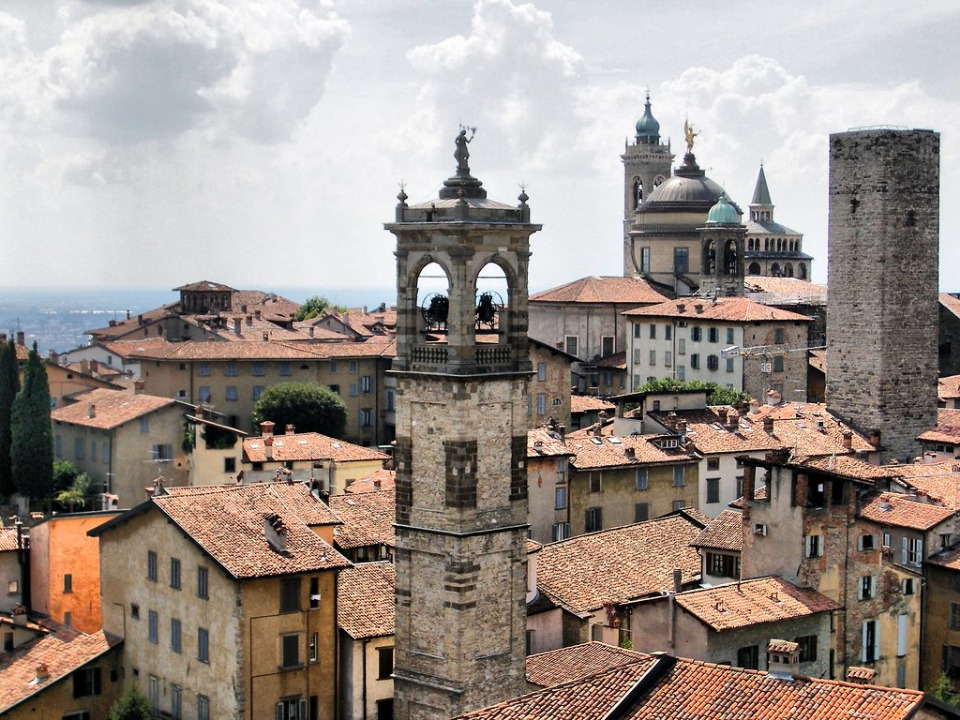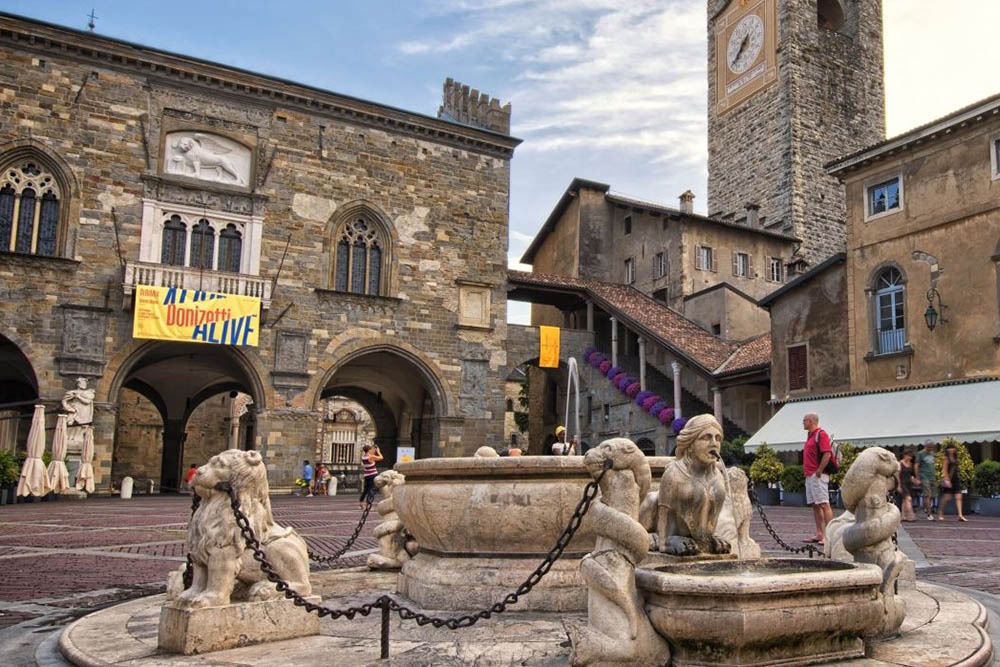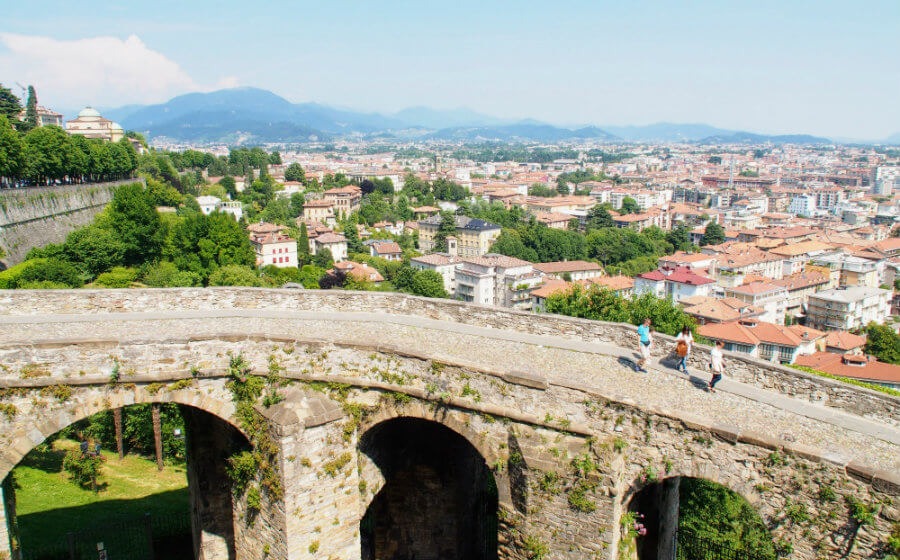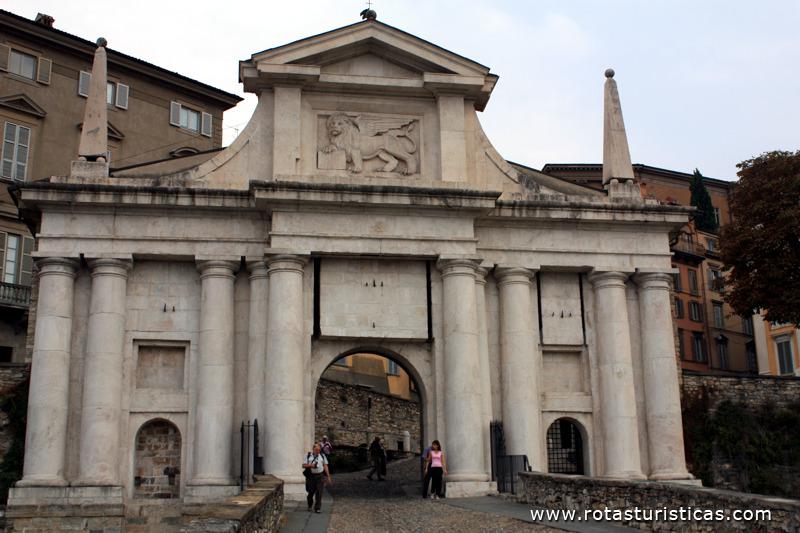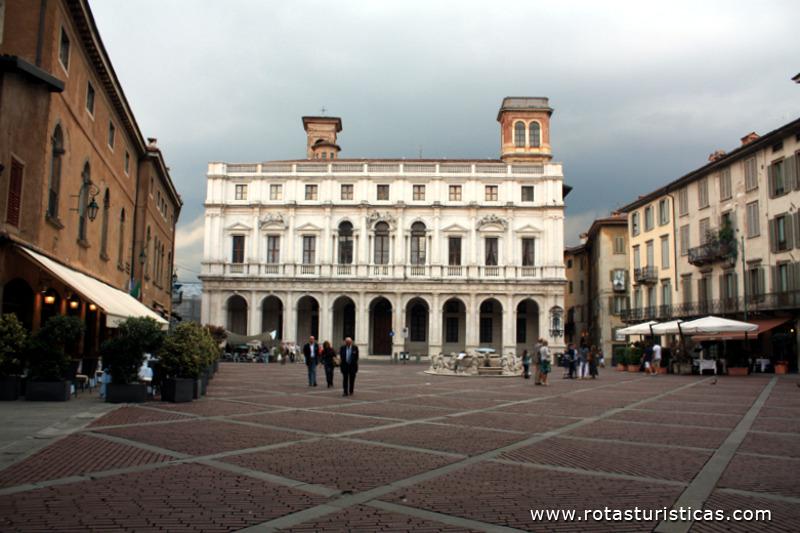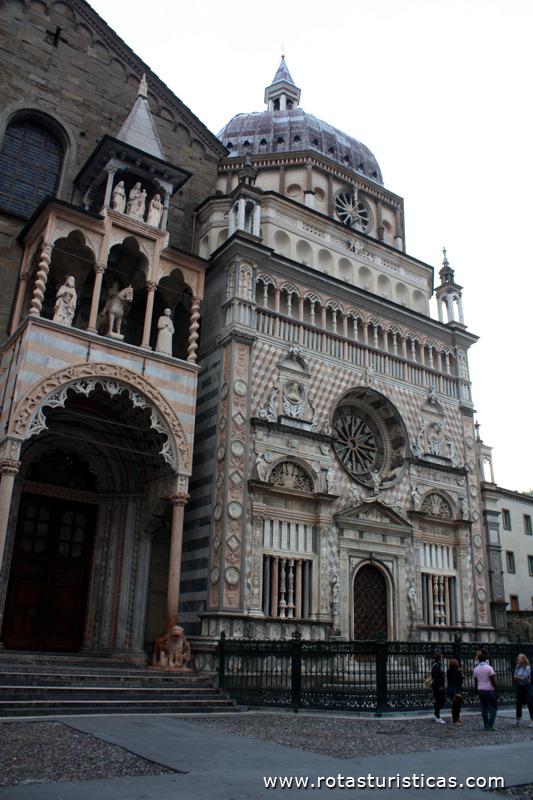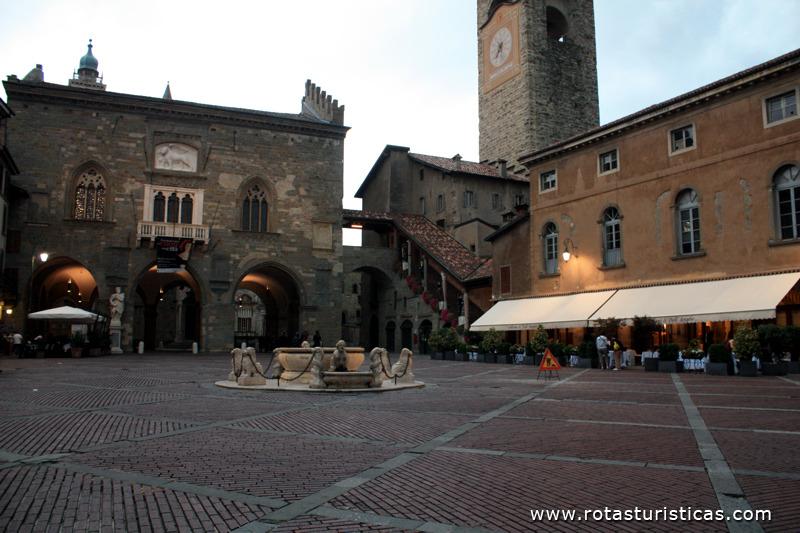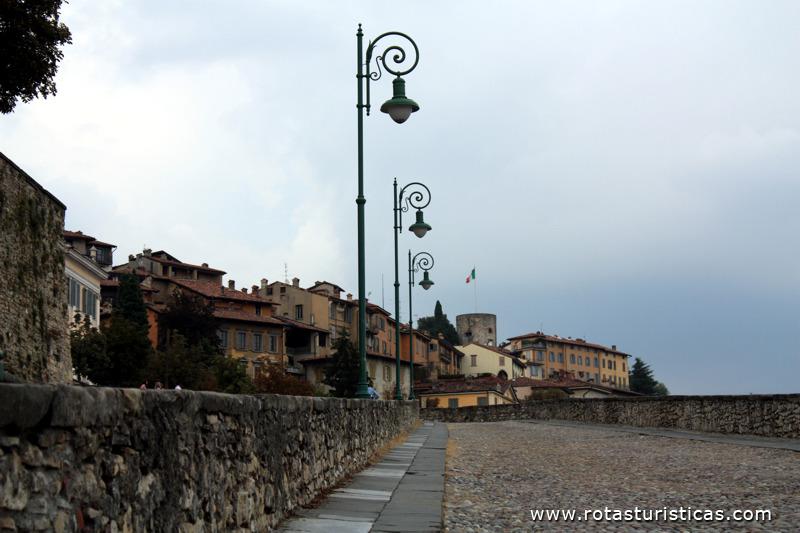Pictures of: Bergamo, Italy
Location map
Airports
Hotels and other Accommodation
What to visit
Where to Eat
Where to have fun
Consulates & Embassies
World Nomads
The Travel Insurance with the largest coverage

The Travel Insurance with the largest coverage

Bergamo
Bergamo is a "comune" (municipality) in the Province of Lombardy in Italy.
It borders Azzano San Paolo, Curno, Gorle, Lallio, Mozzo, Orio al Serio, Paladina, Ponteranica, Seriate, Sorisole, Stezzano, Boldone Tower, Treviolo, Valbrembo.
The city is divided into two distinct parts, Città Alta (Sìta Ólta), the historic center surrounded by a wall, and Città Bassa (Sìta Bàsa), the modern part.
It borders Azzano San Paolo, Curno, Gorle, Lallio, Mozzo, Orio al Serio, Paladina, Ponteranica, Seriate, Sorisole, Stezzano, Boldone Tower, Treviolo, Valbrembo.
The city is divided into two distinct parts, Città Alta (Sìta Ólta), the historic center surrounded by a wall, and Città Bassa (Sìta Bàsa), the modern part.
Tourism
Bergamo, a city in Lombardy, 50 km from Milan, is often surprised by the natural attraction options located between the mountainous north and the south of the hills and valleys.
The Upper Town, a walled medieval section located high on a hill, is the starting point for a historic visit before heading through valleys and mountains of Lombardy countryside.
After a bucolic climb to the historic city center aboard a funicular, cable transport system in operation since 1887, the visitor arrives at Piazza Mercato delle Scarpe, square where seven streets of the city end.
From there, the traveler follows a labyrinthine medieval route through Italian squares such as Piazza Vecchia, a 15th century building that houses the Contarini fountain, the town hall tower, known as Campanone, and the Civic Library with its marble façade. Surrounded by 16th-century ramparts erected by Venetians, the city also has several lookouts that offer panoramic views of the region.
Next door, Piazza del Duomo is home to other historic postcards of the destination such as the Cathedral dedicated to San Alejandro, the imposing Basilica of Santa María Maggiore with its Baroque-style interior decoration, and the Capilla Colleoni, reminiscent of the Lombard Renaissance.
Medieval buildings give way to simple cottages set up at the foot of the mountain, crowded alleys are replaced by lonely paths that lead into the woods, and the bustling common half-day tourism in Bergamo turns into a contemplative journey through mountains and streams that can last for days.
In winter, the landscape around Bergamo changes its tone, so snow sports enthusiasts find themselves in places such as the Seriana and Brembana valleys, where ski slopes of varying difficulty are situated.
Declared a World Heritage Site by UNESCO and considered the best-preserved working-class settlement in southern Europe, Crespi d'Adda still preserves the old factory that until the 1930s attracted families looking for work in this tiny town that currently has one thousand inhabitants.
With the air of an uninhabited city, Crespi d'Adda still maintains the residences of the time when the region housed the factory run by the family of Lombard industrialists known as Crespi. The visit to the city should not last more than half a day and the brief itinerary includes a visit to the old Crespi factory (closed to the public), the cemetery where the family remains of a pyramid-shaped mausoleum. built that city in the late nineteenth century; and views of the meeting of the Adda and Brembo rivers.
In Castione della Presolana, 35 km northeast of Bergamo and about 1000 meters above sea level, the traveler finds the most natural side of the region. Located between forests and the Presolana Massif, the destination has hiking routes with varying degrees of difficulty and travel time, such as the trail leading to Salto degli sposi, where a Polish musician and painter threw themselves hugging each other on a cliff, in 1871.
Located between mountains and valleys, Bergamo is known for its historic sector located on a hill overlooking the region in Lombardy, northern Italy.
Overlooking the Bergamo mountain ranges and the Valle di Scalve, the observation deck over that chasm is one of the most striking scenarios in the itinerary.
One of the highlights is the small Rusio, approximately 9th century settlement, set in the Valle Seriana and considered one of the oldest in the region. There begin the various trails and routes for rock climbers.
Another surprise of the region is the old 16th century mill which currently houses a museum dedicated to its engineering and a restaurant.
South of Castione, another city holds the inland climate of the region. Located on the western shores of Lake Iseo and bordered by medieval alleys, Lovere boasts river walks through small villages on the shores of the blue waters of Iseo.
Throughout this itinerary, the old images of Italy must be repeated over and over, but Lombardy helps travelers looking for experiences that go beyond historical itineraries and typical Italian (lunch) lunches.
The Upper Town, a walled medieval section located high on a hill, is the starting point for a historic visit before heading through valleys and mountains of Lombardy countryside.
After a bucolic climb to the historic city center aboard a funicular, cable transport system in operation since 1887, the visitor arrives at Piazza Mercato delle Scarpe, square where seven streets of the city end.
From there, the traveler follows a labyrinthine medieval route through Italian squares such as Piazza Vecchia, a 15th century building that houses the Contarini fountain, the town hall tower, known as Campanone, and the Civic Library with its marble façade. Surrounded by 16th-century ramparts erected by Venetians, the city also has several lookouts that offer panoramic views of the region.
Next door, Piazza del Duomo is home to other historic postcards of the destination such as the Cathedral dedicated to San Alejandro, the imposing Basilica of Santa María Maggiore with its Baroque-style interior decoration, and the Capilla Colleoni, reminiscent of the Lombard Renaissance.
Medieval buildings give way to simple cottages set up at the foot of the mountain, crowded alleys are replaced by lonely paths that lead into the woods, and the bustling common half-day tourism in Bergamo turns into a contemplative journey through mountains and streams that can last for days.
In winter, the landscape around Bergamo changes its tone, so snow sports enthusiasts find themselves in places such as the Seriana and Brembana valleys, where ski slopes of varying difficulty are situated.
Declared a World Heritage Site by UNESCO and considered the best-preserved working-class settlement in southern Europe, Crespi d'Adda still preserves the old factory that until the 1930s attracted families looking for work in this tiny town that currently has one thousand inhabitants.
With the air of an uninhabited city, Crespi d'Adda still maintains the residences of the time when the region housed the factory run by the family of Lombard industrialists known as Crespi. The visit to the city should not last more than half a day and the brief itinerary includes a visit to the old Crespi factory (closed to the public), the cemetery where the family remains of a pyramid-shaped mausoleum. built that city in the late nineteenth century; and views of the meeting of the Adda and Brembo rivers.
In Castione della Presolana, 35 km northeast of Bergamo and about 1000 meters above sea level, the traveler finds the most natural side of the region. Located between forests and the Presolana Massif, the destination has hiking routes with varying degrees of difficulty and travel time, such as the trail leading to Salto degli sposi, where a Polish musician and painter threw themselves hugging each other on a cliff, in 1871.
Located between mountains and valleys, Bergamo is known for its historic sector located on a hill overlooking the region in Lombardy, northern Italy.
Overlooking the Bergamo mountain ranges and the Valle di Scalve, the observation deck over that chasm is one of the most striking scenarios in the itinerary.
One of the highlights is the small Rusio, approximately 9th century settlement, set in the Valle Seriana and considered one of the oldest in the region. There begin the various trails and routes for rock climbers.
Another surprise of the region is the old 16th century mill which currently houses a museum dedicated to its engineering and a restaurant.
South of Castione, another city holds the inland climate of the region. Located on the western shores of Lake Iseo and bordered by medieval alleys, Lovere boasts river walks through small villages on the shores of the blue waters of Iseo.
Throughout this itinerary, the old images of Italy must be repeated over and over, but Lombardy helps travelers looking for experiences that go beyond historical itineraries and typical Italian (lunch) lunches.
Gastronomy
Eating in Bergamo, as in Italy and most of the Mediterranean is a pleasure, a pleasure for the palate and for many, the best vacation memory. All the products of the region are so tasty, so fresh, so different and all the specialties are so carefully crafted that going to a fast food chain or restaurant with an international menu or ethnic food is almost a crime.
In any tavern are specialties that have been made since time immemorial, and whose recipes have been passed down from generation to generation as the most precious legacy.
The most valuable are the typical regional sausages: salami, cotechino (another variety of salami), sausages, bacon and bacon.
Black truffles are a delicacy of the region, there are three varieties depending on the time of year: melanosporum (November to March), Aestivum (May to August), and Uncinatum (September to December).
Different cheeses: Agri, Branzi, Caprini, Val di Scalve formagella, Stracchino Bronzone, Strachìtund, Taleggio, Turta Orobica, Forma mut, and almost all of exquisite crafts. The region is also famous for its honey production.
"Casonsèi de la bergamasca": ravioli stuffed with meat, bread crumbs, pear, raisins, cheese.
"Scarpinocc de Par": species of ravioli stuffed with grana padano (local cheese) bread crumbs, spices
"Polenta": classic flour produced only in the region, creamy, soft and tomato sauce.
"Taragna": Classic polenta with game meat, sausage and bologna or integrated with cheese during polenta cooking.
"Polenta e uccelli": (polenta with poultry) poultry in a bacon and basil baked brochetta served with polenta.
"Formaggio con la Birra" (Piazza Brembana): sliced cheese marinated in beer, breaded and fried.
"Büseca": folded, meat, white beans, tomatoes, vegetable stock and white wine, whole cooked slowly.
"Casöla": sausages, collard greens, pork.
"Parüch con la panna and il salami": parüc is a type of wild spinach that is cooked with butter and topped with whipped cream and salami slices, accompanied with polenta.
Coniglio alla Poscante: Rabbit with bacon, garlic, white wine and laurel.
Polenta and stufato coi fagioli ": (Polenta and feijoada) Beef, red wine, celery, onion, garlic, carrot, nutmeg, cloves, beans, served with polenta.
"Polenta e osèi": (polenta with birds) the most typical dessert Bergamo. Pan di Spagna topped with yellow marzipan and chocolate birds.
"Turta del Donizet": (Donizetti cake) Cake with pineapple and apricots soaked in candied liquor.
"Turta de Trei": (Torta di Treviglio) Shortbread cake filled with almonds, butter and eggs.
"Pan di Spagna": preparation of cake-based flour, starch, eggs, vanilla, sugar, which is then modified with other ingredients such as chocolate or nuts.
And of course many more regional dishes, all delicious and typical Italian meal of pasta, pizza, soup, etc.
The wine is produced in the area being famous its red, Valcapeio Rosso, its white Bianco Valcapeio and Muscat, Moscato di Scanzo, ideal with spicy cheese and dry deserts. Also, of course, the famous San Pellegrino mineral water.
In any tavern are specialties that have been made since time immemorial, and whose recipes have been passed down from generation to generation as the most precious legacy.
The most valuable are the typical regional sausages: salami, cotechino (another variety of salami), sausages, bacon and bacon.
Black truffles are a delicacy of the region, there are three varieties depending on the time of year: melanosporum (November to March), Aestivum (May to August), and Uncinatum (September to December).
Different cheeses: Agri, Branzi, Caprini, Val di Scalve formagella, Stracchino Bronzone, Strachìtund, Taleggio, Turta Orobica, Forma mut, and almost all of exquisite crafts. The region is also famous for its honey production.
"Casonsèi de la bergamasca": ravioli stuffed with meat, bread crumbs, pear, raisins, cheese.
"Scarpinocc de Par": species of ravioli stuffed with grana padano (local cheese) bread crumbs, spices
"Polenta": classic flour produced only in the region, creamy, soft and tomato sauce.
"Taragna": Classic polenta with game meat, sausage and bologna or integrated with cheese during polenta cooking.
"Polenta e uccelli": (polenta with poultry) poultry in a bacon and basil baked brochetta served with polenta.
"Formaggio con la Birra" (Piazza Brembana): sliced cheese marinated in beer, breaded and fried.
"Büseca": folded, meat, white beans, tomatoes, vegetable stock and white wine, whole cooked slowly.
"Casöla": sausages, collard greens, pork.
"Parüch con la panna and il salami": parüc is a type of wild spinach that is cooked with butter and topped with whipped cream and salami slices, accompanied with polenta.
Coniglio alla Poscante: Rabbit with bacon, garlic, white wine and laurel.
Polenta and stufato coi fagioli ": (Polenta and feijoada) Beef, red wine, celery, onion, garlic, carrot, nutmeg, cloves, beans, served with polenta.
"Polenta e osèi": (polenta with birds) the most typical dessert Bergamo. Pan di Spagna topped with yellow marzipan and chocolate birds.
"Turta del Donizet": (Donizetti cake) Cake with pineapple and apricots soaked in candied liquor.
"Turta de Trei": (Torta di Treviglio) Shortbread cake filled with almonds, butter and eggs.
"Pan di Spagna": preparation of cake-based flour, starch, eggs, vanilla, sugar, which is then modified with other ingredients such as chocolate or nuts.
And of course many more regional dishes, all delicious and typical Italian meal of pasta, pizza, soup, etc.
The wine is produced in the area being famous its red, Valcapeio Rosso, its white Bianco Valcapeio and Muscat, Moscato di Scanzo, ideal with spicy cheese and dry deserts. Also, of course, the famous San Pellegrino mineral water.
Weather
With a warm and temperate climate. .. Uma has a significant amount of rainfall during the year. Even the driest month still has a lot of rainfall. According to Köppen and Geiger, this climate is classified as Cfa. The temperature here averages 12.5 ° C. About 1005 mm of precipitation falls annually.
Other tourist destinations in:
Italy
Italy
Other world tourist destinations
Why to book with CLUBE TRAVEL
The best prices
Our partnerships with the world´s largest operators offer research on the best market prices.
More options
At Rotas Turisticos you can book the hotel, buy the air ticket, book the transfer from the airport to the hotel and vice versa, book the local excursions, rent the car, take travel insurance and consult the places to visit and where to go.
Holiday Tips & Destinations
Hundreds of holiday destinations with all the options that allow you to easily choose the destination that best suits your dream vacation.
CLUBE TRAVEL
Links

